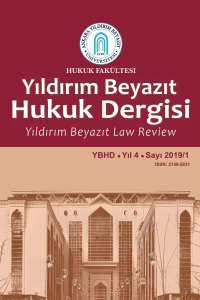Abstract
Kuvvetler ayrılığı ilkesi günümüzde demokratik anayasal yönetim
anlayışının tartışmasız temel unsuru olarak kabul edilmektedir. İktidarı
kullananların yetkilerini sınırlama ihtiyacıyla ortaya çıkan bu ilkenin
tarihsel gelişim süreci İlk Çağ’a kadar uzanmaktadır. Ancak modern anlamıyla
kuvvetler ayrılığı anlayışının kökenleri büyük ölçüde İngiliz filozof Locke ve
Fransız düşünür Montesquieu’nun çalışmalarına dayanmaktadır. Locke’un
yasama-yürütme-federatif erkler ayrımı, Montesquieu’da yasama-yürütme-yargı ayrımı
formunu kazanmıştır. Bu çalışmada, öncelikle üçlü erkler ayrımının gelişim
süreci, düşünürlerin yaklaşımları bakımından ayrı ayrı ele alınmaktadır.
Ardından farklı özellikleri bakımından erkler ayrılığı düşüncelerinin analizi
yapılmaktadır. Locke, Montesquieu, hatta son bölümde kuvvetler ayrılığının yanlış
olduğunu savunan muhaliflerin, Rousseau’nun düşünceleri ele alınmaktadır. Yasamanın
üstünlüğü görüşünün öne çıkması nedeniyle erkler arasındaki ilişkiler için
öngörülen fren ve denge mekanizmasının ancak devrimler döneminden sonra etkin
şekilde uygulama alanı bulduğu öne sürülmektedir.
References
- Ağaoğulları, Mehmet Ali, (Şubat 2002), Kral Devletinden İmparatorluğa, 3. Bası, Ankara-İstanbul, İmge Kitabevi.
- Ağaoğulları, Mehmet Ali / Çulha Zabçı, Filiz / Ergün, Reyda, (Eylül 2009), Kral Devletten Ulus Devlete, 2. Bası, Ankara, İmge Kitabevi.
- Ağaoğulları, Mehmet Ali, (Ekim 2010), Ulus- Devlet ya da Halkın Egemenliği, 2. Bası, Ankara, İmge Kitabevi.
- Akad, Mehmed / Dinçkol, Bihterin Vural / Bulut, Nihat, (2014), Genel Kamu Hukuku, 10. Bası, İstanbul, Der Yayınları.
- Akgül, Mehmet Emin, “Kuvvetler Ayrılığı İlkesini Dönüşümü ve Günümüz Demokratik Rejimlerindeki Anlamı”, Ankara Barosu Dergisi, S: 4, Y: 2010, ss. 79-101.
- Akın, İlhan F., (Ekim 1993), Kamu Hukuku, 7. Bası, İstanbul, Beta Yayınevi.
- Akipek, İlhan, “Kuvvetler Ayrılığı Nazariyesinin Doğmasında Âmil Olan Fikirler”, Ankara Üniversitesi Hukuk Fakültesi Dergisi, C: 9, S: 1, Y: 1952, ss. 167-182.
- Doehring, Karl, (Ekim 2002), Genel Devlet Kuramı (Genel Kamu Hukuku), Ahmet Mumcu (Çev.), İstanbul, İnkılap Kitabevi.
- Duguit, Leon, (Nisan 2005), “Egemenlik ve Özgürlük”, Cemal Bali Akal (Der.), Devlet Kuramı, 2. Bası, Ankara, Dost Yayınevi, ss. 379-400.
- Flaherty, Martin S., “The Most Dangerous Branch Abroad”, Harward Journal of Law and Public Policy, C: 30, S: 1, Sonbahar 2006, ss. 153-171.
- Göze, Ayferi, (Ağustos 2016), Siyasal Düşünceler ve Yönetimler, 16. Bası, İstanbul, Beta Yayınları.
- Jenkins, David, “The Lockean Constitution: Separation of Powers and the Limits of Prerogative”, Mc Gill Law Journal, C: 56, S: 3, Nisan 2011, ss. 543-589.
- Locke, John, (1940), Of Civil Government, New York, J. M. Dentand Sons Ltd. London / E. P. Duttonand Co. Inc.
- Locke, John, (1952), The Second Treatise of Government, New York, The Liberal Arts Press.
- Montesquieu, (Ekim 2017), Yasaların Ruhu Üzerine, Berna Günen (Çev.), 2. Bası, İstanbul, İş Bankası Kültür Yayınları.
- Okandan, Recai Galip, “Âmme Hukukunda Kuvvetler Bölümü Meselesi”, İstanbul Üniversitesi Hukuk Fakültesi Mecmuası, C: 2, Y: 1936, ss. 502-523.
- Poggi, Gianfranco, (Kasım 2014), Devlet: Doğası, Gelişimi ve Geleceği, Aysun Babacan (Çev.) 4. Bası, İstanbul, Bilgi Üniversitesi Yayınları.
- Rousseau, Jean Jacques, (Ekim 1994), Toplum Sözleşmesi, Vedat Günyol (Çev.), 6. Bası, İstanbul, Adam Yayınları.
- Ratnapala, Suri, “John Locke’s Doctrine of the Separation of Powers: a Re-Evaluation”, The American Journal of Jurisprudence, C: 38, S:1, Ocak 1993, ss. 189-220.
- Săraru, Cătălin-Silviu, “The State and the Separation of Powers”, Juridical Tribune, C: 5, S: 2, Aralık 2015, ss. 274-280.
- Sartori, Giovanni, (1996), Demokrasi Teorisine Geri Dönüş, Tunçer Karamustafaoğlu / Mehmet Turhan (Çev.), Ankara, Yetkin Yayınları.
- Schulze, Hagen, (Aralık 2005), Avrupa’da Ulus ve Devlet, Timuçin Binder (Çev.), İstanbul, Literatür Yayınları.
- Şenel, Alaeddin, (1995), Siyasal Düşünceler Tarihi, 4. Kısaltılmış Bası, Ankara, Bilim ve Sanat Yayınları.
- Touchard, Jean, (Ekim 2015), Siyasal Düşünceler Tarihi, İsmail Yerguz (Çev.), İstanbul, Islık Yayınları.
- Tunaya, Tarık Zafer, (1980), Siyasal Kurumlar ve Anayasa Hukuku, İstanbul Üniversitesi Hukuk Fakültesi Yayınları, 4. Bası, İstanbul, Fakülteler Matbaası.
- Uygun, Oktay, (Ocak 2017), Devlet Teorisi, 3. Bası, İstanbul, On İki Levha Yayınları.
- Vile, M.J.C., (1998), Constitutionalism and the Separation of Powers, 2. Bası, Indianapolis, Liberty Fund.
Abstract
The principle of separation of powers is now regarded as a fundamental
element of democratic constitutional governance. The historical development process
of this principle, which emerged with the need of limitation of power users,
extends to the early ages. But the modern sense of the concept of separation of
forces is largely based on the work of the English philosopher Locke and the
French thinker Montesquieu. Locke's legislative-executive-federative separation
of powers has won the form of legislative-executive-judicial separation in
Montesquieu. In this study, the process of development of the division of triad
powers is firstly handled separately in terms of the approaches of thinkers.
Then, comparative analysis of different features is made. Locke, Montesquieu,
and even Rousseau, who argues that the separation of forces is wrong. Finally,
it is argued that the mechanism of checks and balances proposed for relations between
the powers because of the prominence of parliamentary superiority has only been
effectively applied after the period of revolutions.
Keywords
State theory separation of powers legislative power executive power judicial power Locke Montesquieu
References
- Ağaoğulları, Mehmet Ali, (Şubat 2002), Kral Devletinden İmparatorluğa, 3. Bası, Ankara-İstanbul, İmge Kitabevi.
- Ağaoğulları, Mehmet Ali / Çulha Zabçı, Filiz / Ergün, Reyda, (Eylül 2009), Kral Devletten Ulus Devlete, 2. Bası, Ankara, İmge Kitabevi.
- Ağaoğulları, Mehmet Ali, (Ekim 2010), Ulus- Devlet ya da Halkın Egemenliği, 2. Bası, Ankara, İmge Kitabevi.
- Akad, Mehmed / Dinçkol, Bihterin Vural / Bulut, Nihat, (2014), Genel Kamu Hukuku, 10. Bası, İstanbul, Der Yayınları.
- Akgül, Mehmet Emin, “Kuvvetler Ayrılığı İlkesini Dönüşümü ve Günümüz Demokratik Rejimlerindeki Anlamı”, Ankara Barosu Dergisi, S: 4, Y: 2010, ss. 79-101.
- Akın, İlhan F., (Ekim 1993), Kamu Hukuku, 7. Bası, İstanbul, Beta Yayınevi.
- Akipek, İlhan, “Kuvvetler Ayrılığı Nazariyesinin Doğmasında Âmil Olan Fikirler”, Ankara Üniversitesi Hukuk Fakültesi Dergisi, C: 9, S: 1, Y: 1952, ss. 167-182.
- Doehring, Karl, (Ekim 2002), Genel Devlet Kuramı (Genel Kamu Hukuku), Ahmet Mumcu (Çev.), İstanbul, İnkılap Kitabevi.
- Duguit, Leon, (Nisan 2005), “Egemenlik ve Özgürlük”, Cemal Bali Akal (Der.), Devlet Kuramı, 2. Bası, Ankara, Dost Yayınevi, ss. 379-400.
- Flaherty, Martin S., “The Most Dangerous Branch Abroad”, Harward Journal of Law and Public Policy, C: 30, S: 1, Sonbahar 2006, ss. 153-171.
- Göze, Ayferi, (Ağustos 2016), Siyasal Düşünceler ve Yönetimler, 16. Bası, İstanbul, Beta Yayınları.
- Jenkins, David, “The Lockean Constitution: Separation of Powers and the Limits of Prerogative”, Mc Gill Law Journal, C: 56, S: 3, Nisan 2011, ss. 543-589.
- Locke, John, (1940), Of Civil Government, New York, J. M. Dentand Sons Ltd. London / E. P. Duttonand Co. Inc.
- Locke, John, (1952), The Second Treatise of Government, New York, The Liberal Arts Press.
- Montesquieu, (Ekim 2017), Yasaların Ruhu Üzerine, Berna Günen (Çev.), 2. Bası, İstanbul, İş Bankası Kültür Yayınları.
- Okandan, Recai Galip, “Âmme Hukukunda Kuvvetler Bölümü Meselesi”, İstanbul Üniversitesi Hukuk Fakültesi Mecmuası, C: 2, Y: 1936, ss. 502-523.
- Poggi, Gianfranco, (Kasım 2014), Devlet: Doğası, Gelişimi ve Geleceği, Aysun Babacan (Çev.) 4. Bası, İstanbul, Bilgi Üniversitesi Yayınları.
- Rousseau, Jean Jacques, (Ekim 1994), Toplum Sözleşmesi, Vedat Günyol (Çev.), 6. Bası, İstanbul, Adam Yayınları.
- Ratnapala, Suri, “John Locke’s Doctrine of the Separation of Powers: a Re-Evaluation”, The American Journal of Jurisprudence, C: 38, S:1, Ocak 1993, ss. 189-220.
- Săraru, Cătălin-Silviu, “The State and the Separation of Powers”, Juridical Tribune, C: 5, S: 2, Aralık 2015, ss. 274-280.
- Sartori, Giovanni, (1996), Demokrasi Teorisine Geri Dönüş, Tunçer Karamustafaoğlu / Mehmet Turhan (Çev.), Ankara, Yetkin Yayınları.
- Schulze, Hagen, (Aralık 2005), Avrupa’da Ulus ve Devlet, Timuçin Binder (Çev.), İstanbul, Literatür Yayınları.
- Şenel, Alaeddin, (1995), Siyasal Düşünceler Tarihi, 4. Kısaltılmış Bası, Ankara, Bilim ve Sanat Yayınları.
- Touchard, Jean, (Ekim 2015), Siyasal Düşünceler Tarihi, İsmail Yerguz (Çev.), İstanbul, Islık Yayınları.
- Tunaya, Tarık Zafer, (1980), Siyasal Kurumlar ve Anayasa Hukuku, İstanbul Üniversitesi Hukuk Fakültesi Yayınları, 4. Bası, İstanbul, Fakülteler Matbaası.
- Uygun, Oktay, (Ocak 2017), Devlet Teorisi, 3. Bası, İstanbul, On İki Levha Yayınları.
- Vile, M.J.C., (1998), Constitutionalism and the Separation of Powers, 2. Bası, Indianapolis, Liberty Fund.
Details
| Primary Language | Turkish |
|---|---|
| Journal Section | PUBLIC LAW |
| Authors | |
| Publication Date | March 8, 2019 |
| Published in Issue | Year 2019 YBHD 2019/1 |
Cite
Cited By
HÜKÜMET SİSTEMLERİNİN DEMOKRATİKLİK GÖRÜNÜMÜ ÜZERİNE DEĞERLENDİRME
Akdeniz Üniversitesi Hukuk Fakültesi Dergisi
https://doi.org/10.54704/akdhfd.1502259
Osmanlı Son Dönemi Ulemasından Cemil Molla’ya Göre Siyasal Yönetim Biçimleri ve II. Abdülhamid Yönetimi
Osmanlı Medeniyeti Araştırmaları Dergisi
https://doi.org/10.21021/osmed.1170226



